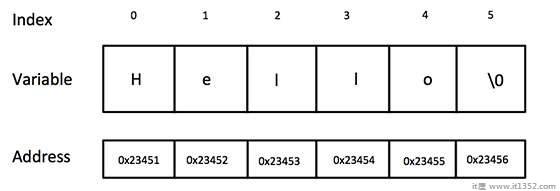C ++提供以下两种类型的字符串表示 :
C风格的字符串.
标准C ++引入的字符串类类型.
C风格的字符串起源于C语言,并继续在C ++中得到支持.该字符串实际上是一维字符数组,由 null 字符'\0'终止.因此,以null结尾的字符串包含构成字符串后跟 null 的字符.
以下声明和初始化创建一个由单词"Hello"组成的字符串".要将空字符保存在数组的末尾,包含字符串的字符数组的大小比单词"Hello"中的字符数多一个.
char greeting [6] = {'H','e','l','l','o','\ 0'};如果你遵循数组初始化的规则,那么你可以写下面的语句如下 :
char greeting[] = "Hello";
以下是C/C ++中上面定义的字符串的内存呈现 :

实际上,不要将空字符放在字符串常量的末尾.初始化数组时,C ++编译器会自动将'\ 0'放在字符串的末尾.让我们尝试打印上面提到的字符串 :
#include <iostream>
using namespace std;
int main () {
char greeting[6] = {'H', 'e', 'l', 'l', 'o', '\0'};
cout << "Greeting message: ";
cout << greeting << endl;
return 0;
}编译并执行上述代码时,会产生以下结果 :
Greeting message: Hello
C ++支持多种函数来处理以null结尾的字符串 :
| Sr.No | 功能&目的 |
|---|---|
| 1 | strcpy(s1,s2); 将字符串s2复制到字符串s1中. |
| 2 | strcat(s1,s2); 将字符串s2连接到字符串s1的末尾. |
| 3 | strlen(s1); 返回字符串的长度s1. |
| 4 | strcmp(s1,s2); 如果s1和s2相同,则返回0;如果s1 |
| 5 | strchr(s1,ch); 返回指向字符串s1中第一个字符ch的指针. |
| 6 | strstr(s1,s2); 返回指向字符串s1中第一次出现的字符串s2的指针. |
下面的例子使用了上面提到的一些函数 :
#include <iostream>
#include <cstring>
using namespace std;
int main () {
char str1[10] = "Hello";
char str2[10] = "World";
char str3[10];
int len ;
// copy str1 into str3
strcpy( str3, str1);
cout << "strcpy( str3, str1) : " << str3 << endl;
// concatenates str1 and str2
strcat( str1, str2);
cout << "strcat( str1, str2): " << str1 << endl;
// total lenghth of str1 after concatenation
len = strlen(str1);
cout << "strlen(str1) : " << len << endl;
return 0;
}当编译并执行上述代码时,它产生的结果如下 :
strcpy( str3, str1) : Hello strcat( str1, str2): HelloWorld strlen(str1) : 10
标准C ++库提供了一个 string 类类型,它支持上面提到的所有操作,另外更多功能.让我们检查以下示例 :
#include <iostream>
#include <string>
using namespace std;
int main () {
string str1 = "Hello";
string str2 = "World";
string str3;
int len ;
// copy str1 into str3
str3 = str1;
cout << "str3 : " << str3 << endl;
// concatenates str1 and str2
str3 = str1 + str2;
cout << "str1 + str2 : " << str3 << endl;
// total length of str3 after concatenation
len = str3.size();
cout << "str3.size() : " << len << endl;
return 0;
}当编译并执行上述代码时,它产生的结果如下 :
str3 : Hello str1 + str2 : HelloWorld str3.size() : 10